Online Poker Pro to Data Science Jedi Master
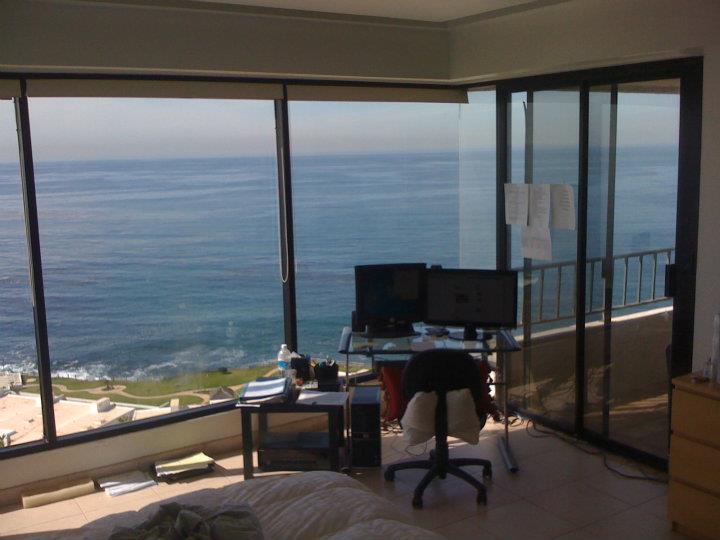
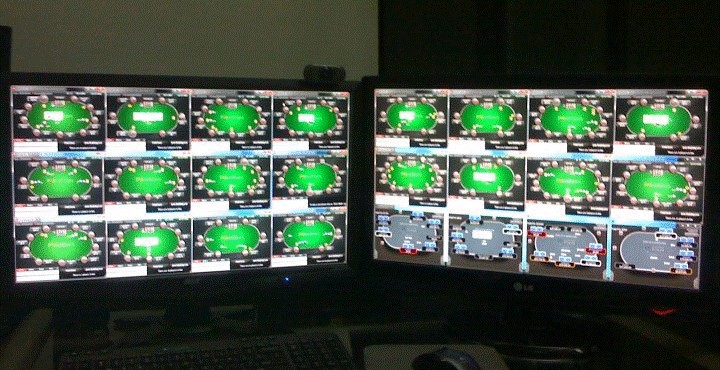
In late 2010, my online poker career began in earnest when I stopped working at a sales job selling marketing to attorneys. Several months earlier I had learned that it was still possible to play online poker in the US, even though the Unlawful Internet Gambling Enforcement Act (UIGEA) had been passed in 2006. UIGEA made it illegal for banks to do transactions with gambling sites. I deposited money on Pokerstars, played in a tournament, and won it.
I had begun playing Texas Holdem at my Frat House while going to school at UCLA. At first, I was terrible… really, really, terrible. I came across a book called Super System by Doyle Brunson that my roommate had left on his desk. I skimmed through it and learned I needed to play much tighter and more aggressively. My results improved immediately and it became apparent to me that poker was not just about luck, but also a game of skill. I made a couple grand or so playing poker in college and flirted with making a career of it when I graduated in 2005. Coming out of college, I was not in the proper mindset to make a career out of such a difficult game. When UIGEA became law and the poker site I played on at the time stopped operating in the US, I stopped playing.
When I won that first tournament I played in 2010, I was hooked. I searched for any information I could get my hands on and even hired a poker coach. It was several years into the great recession, which had put an end to my Commercial Real Estate career. The market had collapsed just after I sold my first two multi-family properties for a combined $4.7 million, and I was soon looking for work.
I had been drifting from one unfulfilling sales job to the next when I won that first tournament in 2010. When I stopped working in sales and began playing poker full time, most people couldn’t understand how I could make a living. I knew it was possible, and I couldn’t find a good reason not to try. Finally, I had found something I was passionate about.
In March 2011, I had my best month playing poker to date. I earned over $5,500 from winning one tournament and a couple other 2nd place finishes. The very next month the United States government used UIGEA to shut down all the big online poker sites. This became known as “Black Friday” in the poker community. Just like my Real Estate career a few years earlier, my poker career was in crisis. My bankroll had been frozen and the top poker sites were no longer available to play on.
My options were a brutal job market or moving to a place where online poker was legal. With most of my bankroll frozen by the US Department of Justice, I had just enough money to move abroad which would leave nothing to play poker with. I decided if I could find someone to stake me to play poker, I would make the move and continue my poker career. After researching my options I accepted a stake from Team Moshman, a well-respected backer in the poker community. Like many of the other 4,000+ online poker professionals, I soon found myself living abroad in an awesome condo on the beach in Baja, Mexico, living my dream, and (unbeknownst to me at the time) preparing myself perfectly for the 21st-century economy.


Calafia Point, Baja California, Mexico
Poker is a game of gathering information from your opponents and using it against them. Whoever can gather info and use it most effectively, has the best chance of winning. This is true for any game of luck and skill. It doesn’t matter if you’re playing poker, the stock market or even running a business. So how do you gather and use information while playing online poker? By mining data (poker hand histories) from your opponents, and displaying that data in real time in the form of numeric statistics and visualized data on your opponents playing tendencies. It looks like this:
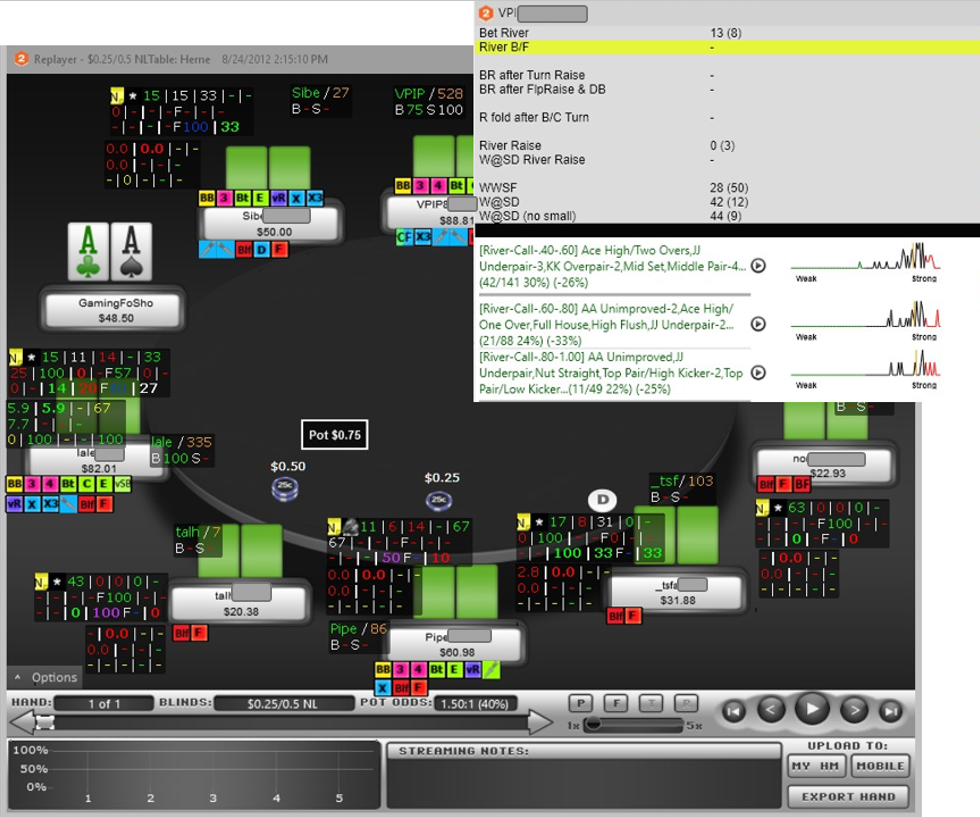
Hold’em Manager II (HEM2) is the software I used to display this data. HEM2 uses a PosgreSQL database to mine hand histories from the poker site and display the data, all in real-time. An alternate option for HEM2 is Poker Tracker. HEM2 or Poker Tracker are to online poker as the programming languages R or Python are to the data science field.
HEM2 provides more statistics on your opponents than you could ever use while playing. It is up to you to decide which ones to include in your Heads Up Display (HUD) and underlying popups. Screen space is limited so you must decide what stats to include based on what info is most valuable to you.
I used the following guides to remember what each number or badge meant and what additional info would pop up when I clicked on a certain number:
Heads Up Display (HUD) Overview
Popup Stat and Badge Definitions
Definitions of Stat Abbreviations & Poker Terms
The badges are data visualization at its finest. Each badge represents a specific leak (leak=costly tendency) which can be exploited when a relevant situation arises. These badges create opportunities for automated, profitable decisions.
The badge shown to the right indicates an opponent in the Big Blind folds 72% or more (much too often) to a raise from the Button. If an opponent in the Big Blind has this badge when I’m on the Button, and everyone folds to me, I can be very aggressive and raise with a very wide range of hands, especially if my stats indicate the opponent in the Small Blind is a tight player too.

Data Science is about using data for solving problems or creating value. Raj Bandyopadhyay, Director of Data Science Education for Springboard, employs a helpful framework that he calls “the Data Science Process”:
Step 1: Frame the problem
Step 2: Collect the raw data needed for your problem
Step 3: Process the data for analysis
Step 4: Explore the data
Step 5: Perform in-depth analysis
Step 6: Communicate results of the analysis
I followed a very similar process in my poker career. Step 3 isn’t necessary for online poker because the data provided by the poker site is already clean so learning to process data has been my main focus. Step 6 is also unnecessary as I’ve done the analysis for myself and do not need to communicate it to anyone else. These are the two areas I will need to focus my attention on while learning.
What Can Data Do?
The data provided by HEM2 can solve many more problems for an online poker player than just the ones that arise while playing.
Which Poker Tables to Play?
An app called TableScan Turbo plugs into HEM2 and the poker sites and displays data on which poker tables are the most profitable to play at. This is based on the ability of each player and how much money they have in front of them.
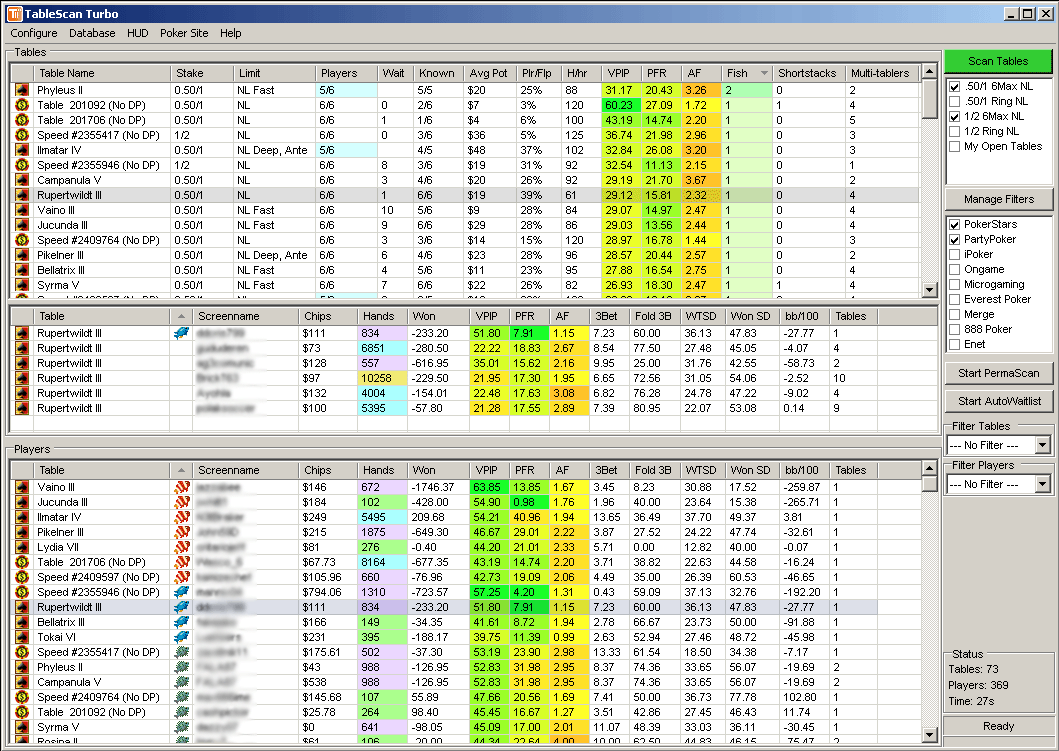
How to Improve Play?
An app called Leak Buster displays all of your own playing statistics vs. the optimal playing stats. A leak is found when your playing stats deviate too far from optimal, and instructions are given on how to improve play in that particular area.
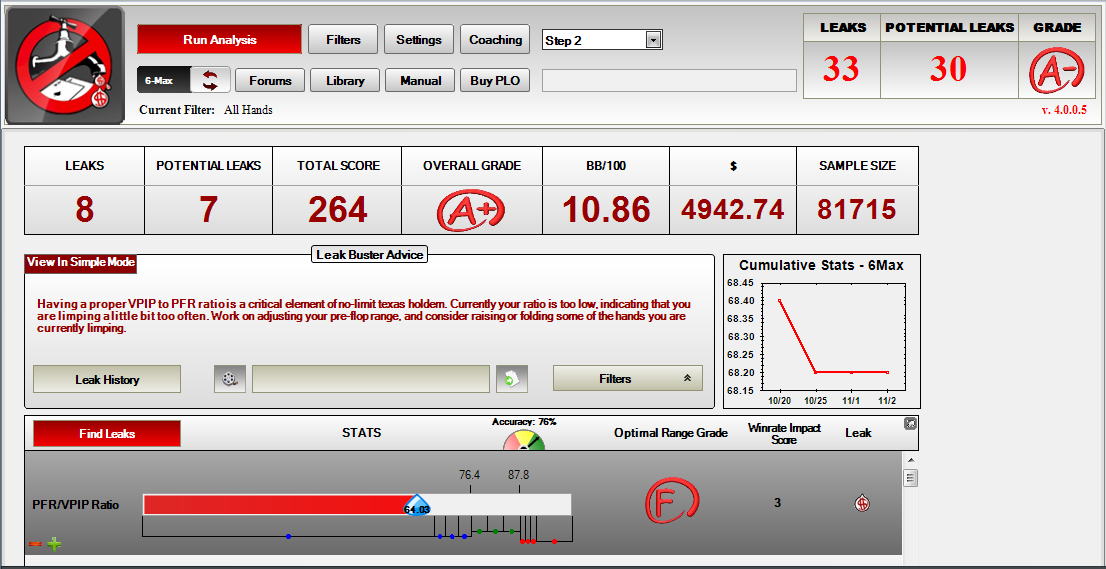
How to improve emotional control?
No matter how good you are, if you can’t maintain your composure when things don’t go well and you go “on tilt” you will lose money. This one was very important for me to resolve because before my poker career I was influenced often by my emotions. Whether it was a coworker, love interest or uncooperative inanimate object, my actions were dictated by emotion more often than I’d like to admit. I didn’t need data to tell me I was losing money to tilt when I first started playing. I did use data and an app called TiltBreaker, to determine how well I was improving. TiltBreaker showed how my play was affected when I lost (or won) money which told me what my stop loss should be (Stop Loss = How much I can lose in a session before walking away).
Thanks to The Mental Game of Poker by Jared Tendler, M.S., Elements of Poker by Tommy Angelo, The Poker Mindset by Ian Taylor & Mathew Hilger, and extensive study of the stoic philosophy, my play became virtually unaffected by ups and downs, according to the data. My focus on eliminating emotion and ego from decisions and actions at the poker table has translated well to many other aspects of life. Having a high level of patience, which keeps emotions at bay, is an important skill for coding, which can get very frustrating at times.
How Long should I play?
TiltBreaker also provided data on how your play was affected by the amount of time you played. Before using TiltBreaker, I played long 2+ hour sessions at a time. TiltBreaker indicated that my play dropped off significantly after just 60 minutes so I began playing shorter sessions.
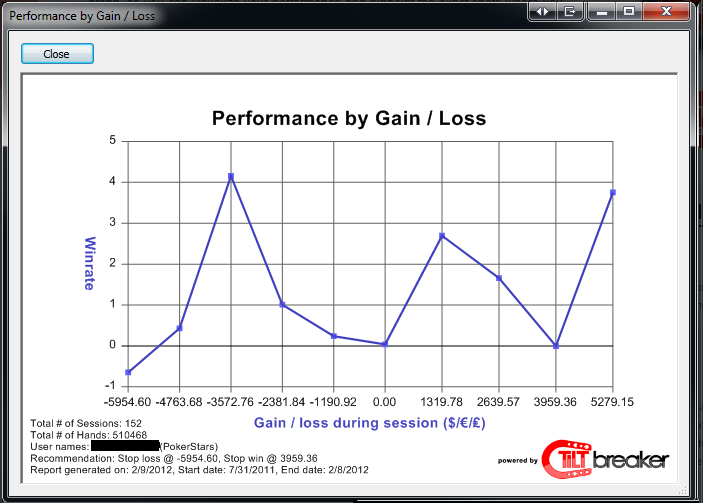
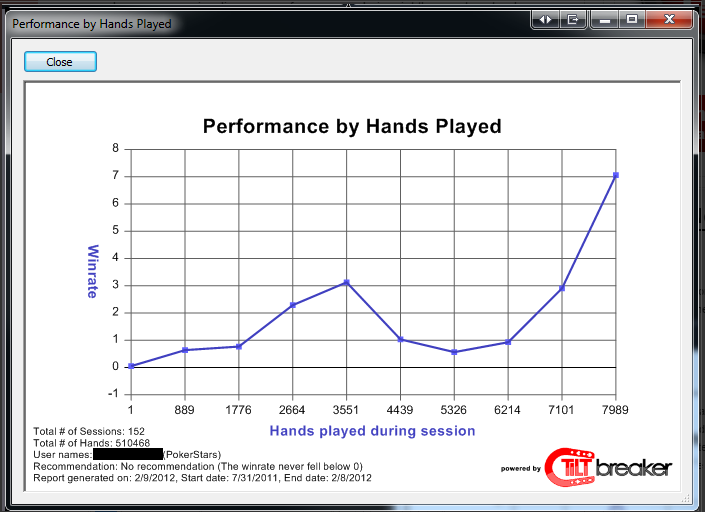
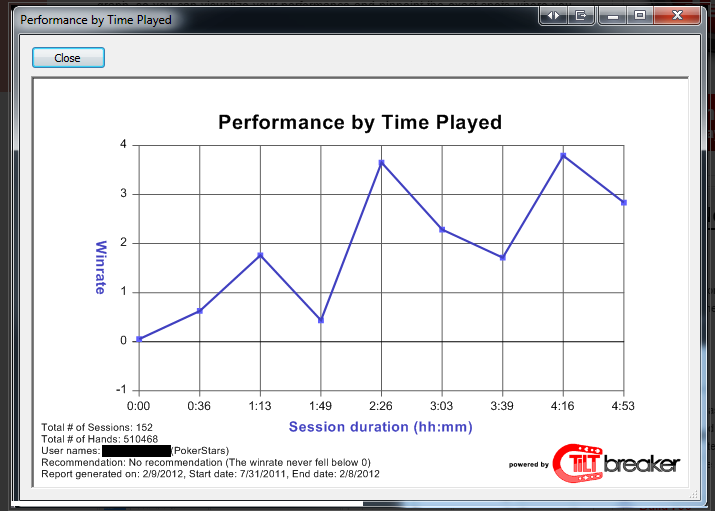
In the real world, data seems to be able to solve almost any problem. It can forecast the presidential election or predict if the Dodgers will win the World Series. Data can predict which of your customers are likely to buy again soon, and I worked on a project to do just that for a company called StandDesk. In January 2009 Hal Varian, Google’s Chief Economist, tells the McKinsey Quarterly: “…The ability to take data—to be able to understand it, to process it, to extract value from it, to visualize it, to communicate it – that’s going to be a hugely important skill in the next decades… Because now we really do have essentially free and ubiquitous data. So the complimentary scarce factor is the ability to understand that data and extract value from it… I do think those skills – of being able to access, understand, and communicate the insights you get from data analysis – are going to be extremely important…”
My online poker career gave me a solid foundation for embarking on a career in Data Science. I have a lot of learning left to do. According to the “Adult Learning Model,” I’m entering the second stage of learning Data Science; Conscious Incompetence. I’m just beginning to understand all the things I still need to learn. The image below provides a good overview of what those skills are and I have a long way to go to become a Data Science Jedi Master. I find that very exciting as I’m once again passionate about my career path.
Data Science Clock by Jamie Whitehorn
Blog post #2 will be a little more fun as I’ll write about how I used automation and a will poker hack called “Pre-Commitment” to (finally) learn how to play guitar (and not sound terrible).
Blogger Disclosure: I receive compensation for links in this post. Read full disclosure here.
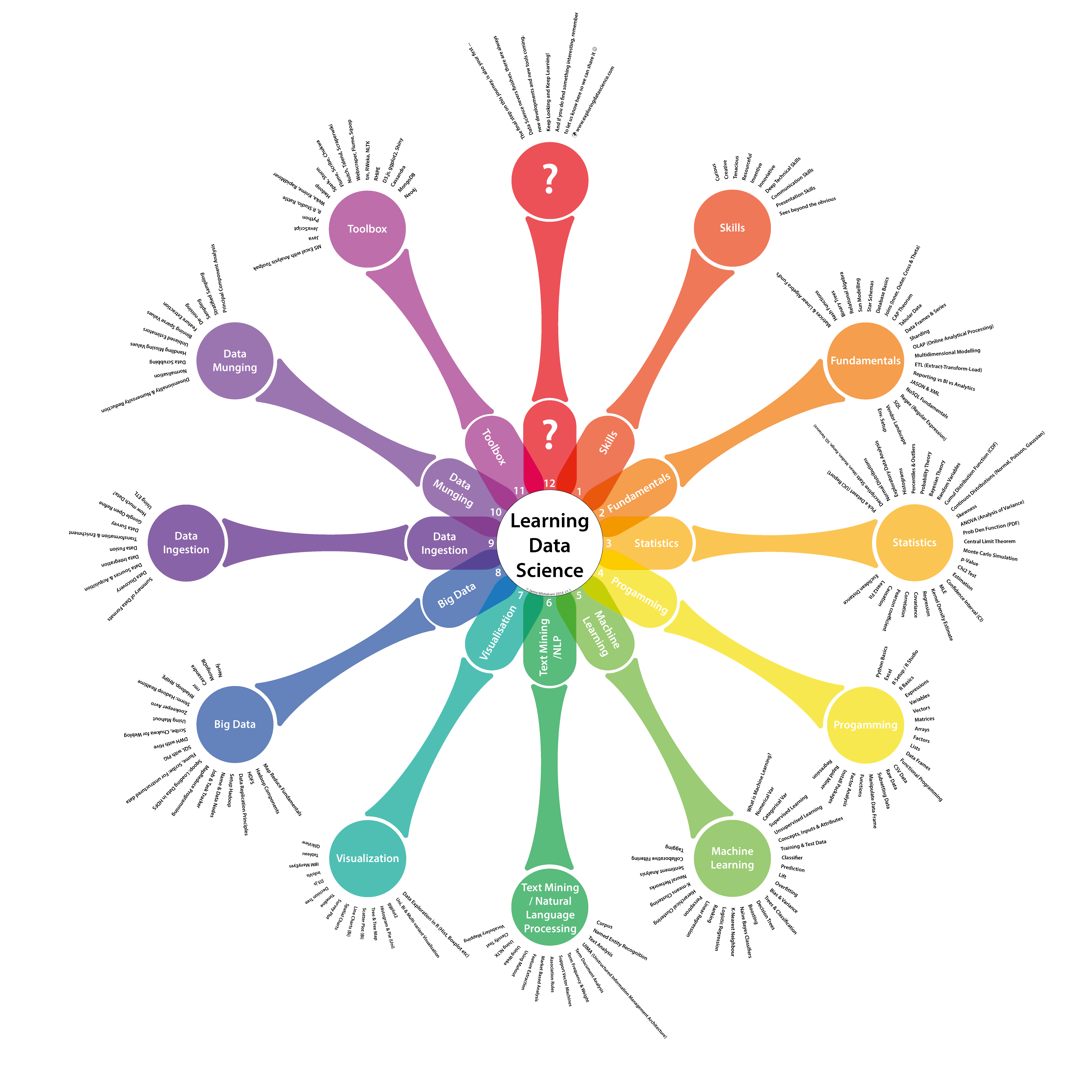
Recent Comments